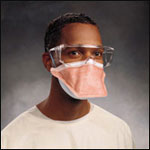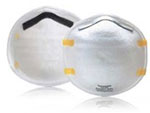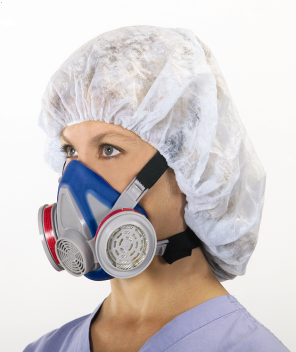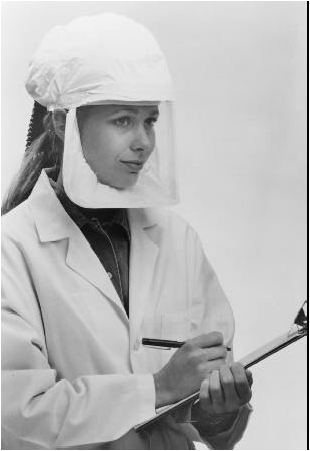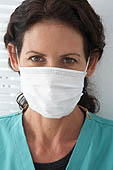Form 4 Antineoplastic Agents (Compound)
Survey of Healthcare Workers' Health and Safety Practices
Attachment I3_Module B_FINAL_08042010
Secondary Hazard Module
OMB: 0920-0860
MODULE B: Antineoplastic Agents (Compound) Form Approved
7/23/10 OMB No. 10AP-xxxx
Expiration Date: xx/xx/2011
PROGRAMMING INSTRUCTIONS APPEAR IN BLUE.
|
|
During your career, how long have you compounded antineoplastic agents?
|
|
|
||
|
|||||
|
|
What training have you received on the safe handling of antineoplastic agents?
Please all that apply.
|
|
|
||
|
|||||
|
|
When was the last time you received training on the safe handling of antineoplastic agents?
|
|
|
||
|
|||||
|
|
How familiar are you with the following guidance documents on the safe handling of antineoplastic agents? |
|
Very |
Somewhat |
Not at All |
a. ASHP guidelines for handling hazardous drugs |
|
|
|
|
|
b. NIOSH Alert on Preventing Exposures to Antineoplastic Agents and Other Hazardous Drugs |
|
|
|
|
|
c. ONS Safe Handling of Hazardous Drugs |
|
|
|
|
|
d. Occupational Safety and Health Administration (OSHA) guidelines for the management of antineoplastic drugs |
|
|
|
|
|
|
|||||
If you work for more than one employer, the following questions apply to your primary employer, i.e., the one for which you typically work the most hours. If you are self-employed, consider yourself the employer. |
|||||
|
|||||
|
|
Does your employer have procedures that address safe compounding of antineoplastic agents?
|
|
|
||
|
|||||
|
|||||
|
|
During the past 7 calendar days, which of the following antineoplastic agents did you compound? Please all that apply. display calendar highlighting the past 7 calendar days. applies to all questions with ‘in the past 7 calendar days. |
||
|
|||
|
|
|
____________________________
|
|
|
During the past 7 calendar days, on how many days did you compound antineoplastic agents? |
|
|
|
||||
|
|
|||||||
|
|
During the past 7 calendar days, what was the total number of doses of antineoplastic agents that you compounded?
|
|
|
|
||||
|
|
|||||||
|
|
During the past 7 calendar days, the total number of doses of antineoplastic agents you compounded was...
|
|
|
|
||||
|
|
|||||||
|
|
Of the total number of antineoplastic drug doses you compounded during the past 7 calendar days…
|
|
|
|
||||
a. …what percent was liquid?
|
|
_______ % IF 100%, SKIP QUESTION 18
|
|
|||||
b. …what percent were tablets or capsules?
|
|
_______% FILL IN DIFFERENCE BETWEEN 100% AND NUMBER ENTERED IN 10a IF 100%, SKIP QUESTIONS 14-17, 19b,19c, and 44-46
|
|
|||||
|
|
|||||||
|
|
|||||||
|
|
During the past 7 calendar days, in which of the following areas did you compound antineoplastic agents? Please all that apply.
|
|
||||||
If only one response marked in Question 11 è Go to Question 13. |
|
|||||||
|
|
|||||||
|
|
Of the locations you checked above, please indicate the area where you most often compounded antineoplastic agents.
|
|
list
areas marked in Question 11 (use radio buttons) |
|||||
|
|
|||||||
|
|
During
the past 7
calendar days,
how often did you compound
antineoplastic agents
|
Always |
Sometimes |
Never |
||||
a. …room or area dedicated to the preparation of these agents? |
|
|
|
|||||
b. …biological safety cabinet? |
|
|
|
|||||
c. …isolator? |
|
|
|
|||||
d. …other (Please specify):____________ |
|
|
|
|||||
if ‘100%’ tablets/capsules in question 10b, skip questions 14-17 |
|
|||||||
|
|
During the past 7 calendar days, did you prime IV tubing?
|
|
||||||
|
|
|||||||
|
|
During the past 7 calendar days, how often did you prime IV tubing inside a ventilated cabinet or isolator?
|
|
||||||
|
|
|||||||
|
|
During the past 7 calendar days, how often did you prime IV tubing with a liquid other than the antineoplastic agent?
|
|
||||||
|
|
|||||||
|
|
During the past 7 calendar days, which of the following devices did you use when transferring liquid antineoplastic agents from primary packaging (such as vials) to dosing equipment (e.g., infusion bags)? Please all that apply.
|
|
|
|||||
IF ‘100%’ LIQUID in Question 10a, skip Question 18
|
|
|||||||
|
|
During the past 7 calendar days, how often did you crush tablets or open capsules of antineoplastic agents?
|
|
|
|||||
|
|
|||||||
Questions addressing work practices and use of personal protective clothing and equipment will help us understand what is currently used and under what circumstances. Depending on your job and exposures, these may not be required.
if ‘100%’ tablets/capsules in question 10b, skip questions 19b and 19c.
|
|||||
|
|
During the past 7 calendar days when compounding antineoplastic agents, how often did you …
|
Always |
Sometimes |
Never |
|
|
|
|
|
||
|
|
|
|
||
c. …use a plastic-backed absorbent pad under the open drug vials and other preparation materials? |
|
|
|
||
d. …change gloves at least every 30 minutes? |
|
|
|
||
e. …change gloves immediately when damaged or contaminated? |
|
|
|
||
f. …change disposable gowns after wearing for more than 3 hours? |
|
|
|
||
g. …change disposable gowns immediately when damaged or contaminated? |
|
|
|
||
h. …wash hands after removing gloves? |
|
|
|
||
i. …wear shoe covers? |
|
|
|
||
j. …wear a head cover? |
|
|
|
||
|
|||||
|
|
During the past 7 calendar days when packaging antineoplastic agents for delivery to the area(s) where they are administered, how often did you…
|
Always |
Sometimes |
Never |
|||||||||
a. …package antineoplastic agent dosages in sealable plastic bags? |
|
|
|
||||||||||
b. …attach a warning label (e.g., “hazardous”, “chemotherapy”, etc) to packages of antineoplastic agents? |
|
|
|
||||||||||
c. …store prepared antineoplastic agents in an area restricted to authorized personnel? |
|
|
|
||||||||||
d. …obtain signature acknowledging receipt of antioneoplastic agent(s) from person administering the drug(s) or his/her designee? |
|
|
|
||||||||||
e. …carry a spill kit during transportation of antineoplastic agent(s)? |
|
|
|
||||||||||
IF ‘100%’ tablets/capsules in Question 10b, skip Questions 21-28. |
|
||||||||||||
|
|
During the past 7 calendar days, how many spills (even a few drops) occurred inside of a ventilated cabinet or isolator while you were compounding liquid antineoplastic drugs?
|
No spills |
1-2 spills |
3-5 spills |
More than 5 spills |
|
|||||||
a. Spills of less than 5 ml |
|
|
|
|
|
||||||||
b. Spills of 5 ml or more |
|
|
|
|
|
||||||||
|
|
||||||||||||
If ‘No spills’ marked in BOTH 21a and 21b è Go to Question 25. Otherwise è Go to Question 22. |
|
||||||||||||
|
|
||||||||||||
|
|
How often was/were the spill(s) cleaned up? |
|
|
|
|||||||||
|
|
||||||||||||
|
|
How often did you yourself clean up the spill(s)? |
|
|
|
|||||||||
|
|
||||||||||||
|
|
Who cleaned up the spill(s)? Please all that apply. |
|
|
|
|||||||||
|
|
||||||||||||
|
|
In the past 7 calendar days, how many spills (even a few drops) occurred anywhere outside of a ventilated cabinet or isolator while you were compounding or otherwise handling liquid antineoplastic drugs? |
No spills |
1-2 spills |
3-5 spills |
More than 5 spills |
|
|||||||
a. Spills of less than 5 ml |
|
|
|
|
|
||||||||
b. Spills of 5 ml or more |
|
|
|
|
|
||||||||
If ‘No spills’ marked in BOTH 25a and 25b è Go to Question 29. Otherwise è Go to Question 26. |
|
||||||||||||
|
|
||||||||||||
|
|
How often was/were the spill(s) cleaned up? |
|
|
|
|||||||||
|
|
||||||||||||
|
|
How often did you yourself clean up the spill(s)?
|
|
|
|
|||||||||
|
|
||||||||||||
|
|
Who cleaned up the spill(s)? Please all that apply. |
|
|
|
|||||||||
|
|
||||||||||||
|
|
Are hazardous drug spill kits readily available?
|
|
|
|
|||||||||
|
|
||||||||||||
|
|
During the past 7 calendar days, did your skin come into direct contact with antineoplastic agents during compounding activities? |
|
|
|
|||||||||
|
|
||||||||||||
|
|
Has exposure monitoring (e.g., air sampling, wipe sampling) been conducted in the past 12 months to assess your or your co-workers’ exposure to antineoplastic agents?
|
|
|
|
|||||||||
|
|
||||||||||||
|
|
A medical surveillance program may include work history, physical exam, blood and/or urine tests, etc. Do you participate in a medical surveillance program that addresses potential health effects of exposure to antineoplastic agents? |
|
|
|
|||||||||
|
|
||||||||||||
|
|
In the past year, have you accidentally punctured your skin with a sharp while compounding antineoplastic agents? |
|
|
|
|||||||||
|
|
||||||||||||
Questions addressing work practices and use of personal protective clothing and equipment will help us understand what is currently used and under what circumstances. Depending on your job and exposures, these may not be required.
|
|
||||||||||||
|
|
During the past 7 calendar days, how often did you wear a nonabsorbent disposable gown with closed front and tight cuffs while compounding antineoplastic agents?
|
|
|
|
|||||||||
|
|
What were the reason(s) you did not always wear a nonabsorbent disposable gown with closed front and tight cuffs while compounding antineoplastic agents? Please all that apply.
|
|
|
If only one response marked in Question 35 è Go to Question 37. |
|||
|
|||
|
|
Of the reasons you checked above, please indicate the most important reason you did not always wear a nonabsorbent disposable gown with closed front and tight cuffs while compounding antineoplastic agents. |
|
list reasons marked in Question 35 (use radio buttons)
|
|
|||
|
|
In your current job, have you taken home any clothing that came into contact with antineoplastic agents? |
|
|
|
|||
|
|
During the past 7 calendar days, how often did you wear chemotherapy gloves while compounding antineoplastic agents?
Note: Chemotherapy glove: a medical glove that has been approved by FDA for use when handling antineoplastic agents. |
|
|
|
|||
When wearing chemotherapy gloves, how often did you wear two pairs (i.e., double glove)?
|
|
|
|
If ‘always’ is marked in Question 38 è Go to Question 42.
If ‘sometimes’ is marked in Question 38 è Go to Question 40.
|
|
What were the reason(s) you did not always wear chemotherapy gloves while compounding antineoplastic agents? Please all that apply.
|
|
______________________________
|
If only one response marked in Question 40 è Go to Question 42. |
|||
|
|||
|
|
Of the reasons you checked above, please indicate the most important reason you did not always wear chemotherapy gloves while compounding antineoplastic agents. |
|
list reasons marked in Question 40 (use radio buttons)
|
|
|
|
During the past 7 calendar days, did you perform any of the following activities while wearing gloves that had been used to handle antineoplastic agents?
|
Yes |
No |
||||||
a. Use phone/ cell phone/pager |
|
|
|||||||
b. Touch a computer keyboard, mouse, monitor or calculator |
|
|
|||||||
c. Handle files or charts |
|
|
|||||||
d. Touch door knobs, cabinets, drawers or product bins |
|
|
|||||||
e. Eat, drink, chew gum or smoke |
|
|
|||||||
f. Use pen or pencil (outside of lab hood) |
|
|
|||||||
g. Touch waste basket/garbage bags (outside of lab hood) |
|
|
|||||||
h. Use restroom |
|
|
|||||||
i. Apply cosmetics (e.g., lip balm) |
|
|
|||||||
|
|||||||||
|
|
During the past 7 calendar days, did you remove and later put back on the gloves you had worn while compounding antineoplastic agents? |
|
|
||||||
if ‘100%’ tablets/capsules in question 10b, skip questions 44-46
|
|||||||||
|
|
During the past 7 calendar days, how often did you wear eye or face protection (e.g., goggles, face shield) while compounding liquid antineoplastic agents? Do not include personal eye glasses.
|
|
|
||||||
|
|||||||||
|
|
What were the reason(s) you did not always wear eye or face protection while compounding liquid antineoplastic agents? Please all that apply.
|
|
|
||||||
If only one response marked in Question 45 è Go to Question 47. |
|||||||||
|
|||||||||
|
Of the reasons you checked above, please indicate the most important reason you did not always wear eye or face protection while compounding liquid antineoplastic agents. |
|
list reasons marked in Question 45 (use radio buttons)
|
||||||
|
|||||||||
|
|
During the past 7 calendar days, did you wear any of the following while compounding antineoplastic agents?
Please all that apply.
|
||
|
|
|
|
|
|
|
|
|
|
|
q I don’t know
|
|
|||
DISPLAY FOLLOWING NOTE ON A SEPARATE SCREEN for all respondents (except those who marked ‘I don’t know’): THE FOLLOWING QUESTIONS ASK ABOUT RESPIRATORS. STANDARD SURGICAL MASKS ARE NOT RESPIRATORS.
IF RESPONDENT MARKED ‘N95 RESPIRATOR’, ‘HALF-FACEPIECE AIR PURIFYING RESPIRATOR’ OR ‘POWERED AIR PURIFYING RESPIRATOR’ IN QUESTION 47 è GO to Question 48.
IF RESPONDENT MARKED ONLY ‘STANDARD SURGICAL MASK’ OR ‘NONE OF THE ABOVE’ IN QUESTION 47 è GO to Question 49.
IF RESPONDENT MARKED ‘I DON’T KNOW’ IN QUESTION 47 è GO to INSTRUCTIONS IN QUESTION 51. |
|||
|
||||||
|
|
How often did you wear a N95 respirator, half-facepiece air purifying respirator or a powered air purifying respirator while compounding antineoplastic agents? |
|
|
|||
|
||||||
|
What were the reason(s) you did not always wear a N95 respirator, a half-facepiece air purifying respirator with particulate cartridge, or a powered air purifying respirator while compounding antineoplastic agents? Please all that apply. |
|
|
|||
|
||||||
If RESPONDENT marked more than one reASON in Question 49 è Go to Question 50. Otherwise è Go to INSTRUCTIONS BEFORE QUESTION 51 |
||||||
|
Of the reasons you checked above, please indicate the most important reason you did not always wear a respirator while compounding antineoplastic agents. |
|
list reasons marked in Question 49 (use radio buttons)
|
|||
|
||||||
If RESPONDENT marked ‘N95 respirator’ or ’Half-facepiece air purifying respirator’ in Question 47 è Go to Question 51. Otherwise è EXIT MODULE AND Go to Core Module IF THIS IS THE FIRST HAZARD MODULE COMPLETED IF THIS IS THE SECOND HAZARD MODULE COMPLETED, END SURVEY. end with ‘Thank you’ statement. |
||||||
|
||||||
|
|
Have you been fit-tested for the respirator(s) you use for compounding antineoplastic agents? |
|
è EXIT MODULE AND Go to Core Module IF THIS IS THE FIRST HAZARD MODULE COMPLETED IF THIS IS THE SECOND HAZARD MODULE COMPLETED, END SURVEY. end with ‘Thank you’ statement. |
|||
Thank you for participating in the NIOSH Health and Safety Practices Survey of Healthcare Workers. Your answers have been submitted.
Public reporting burden of this collection of information is estimated to average 11 minutes per response, including the time for reviewing instructions, searching existing data sources, gathering and maintaining the data needed, and completing and reviewing the collection of information. An agency may not conduct or sponsor, and a person is not required to respond to a collection of information unless it displays a currently valid OMB control number. Send comments regarding this burden estimate or any other aspect of this collection of information, including suggestions for reducing this burden to CDC/ATSDR Reports Clearance Officer, 1600 Clifton Road NE, MS D-74, Atlanta, Georgia 30329-4018; ATTN: PRA (10AP-xxxx).
| File Type | application/vnd.openxmlformats-officedocument.wordprocessingml.document |
| File Title | Please respond to the following questions by checking the box next to your answer choice |
| Author | Marci Treece |
| File Modified | 0000-00-00 |
| File Created | 2021-02-02 |
© 2026 OMB.report | Privacy Policy
